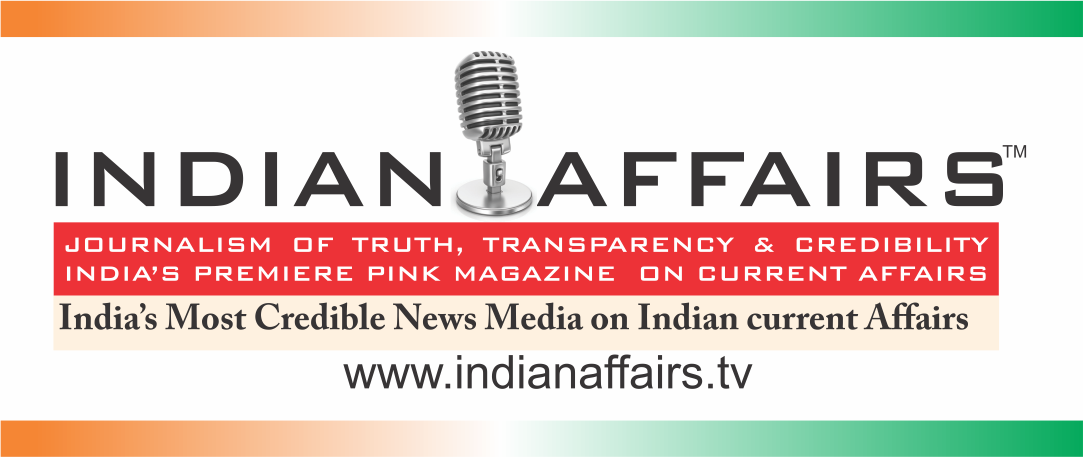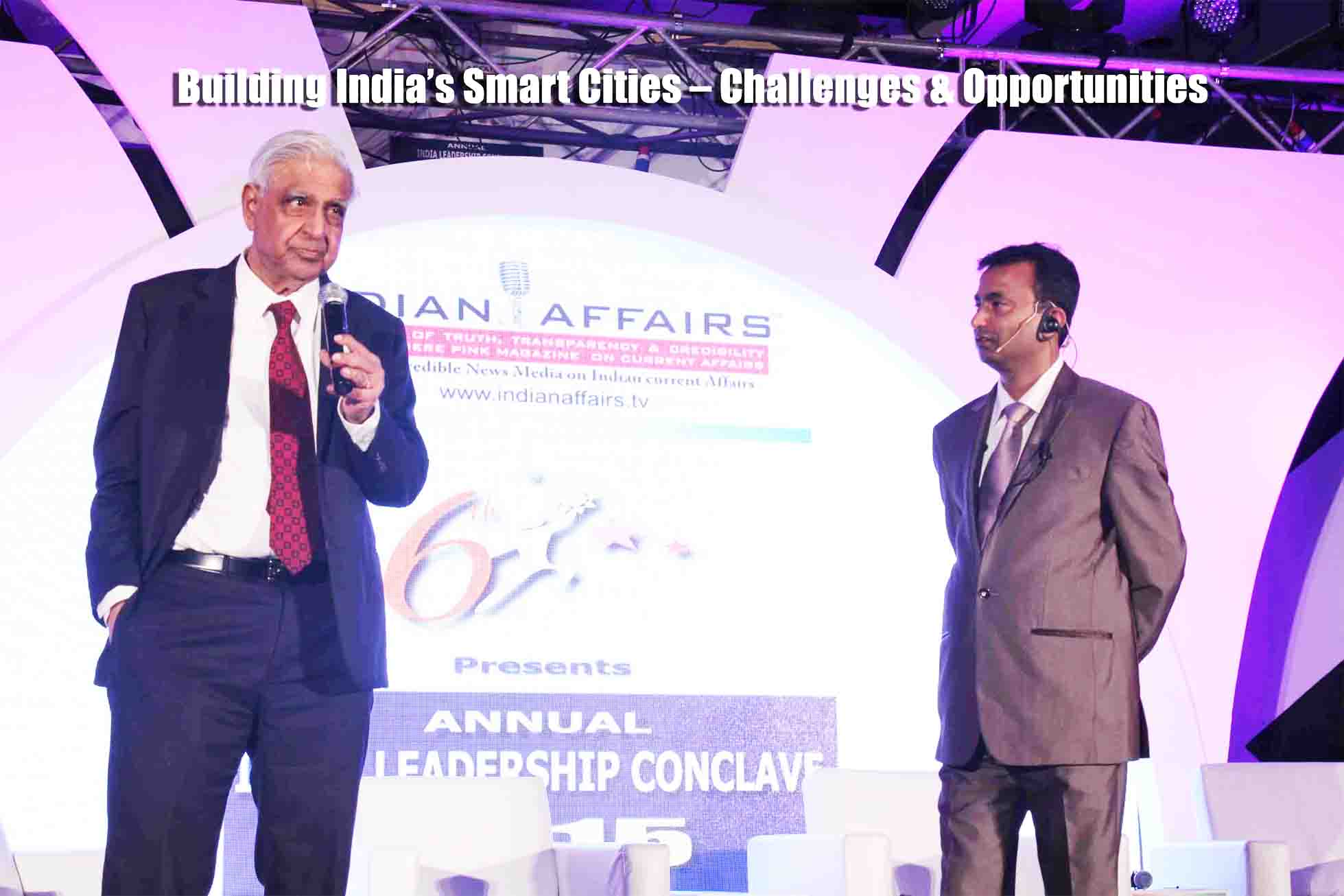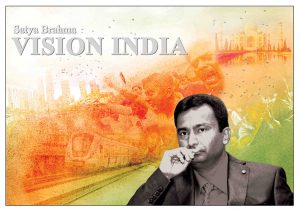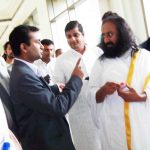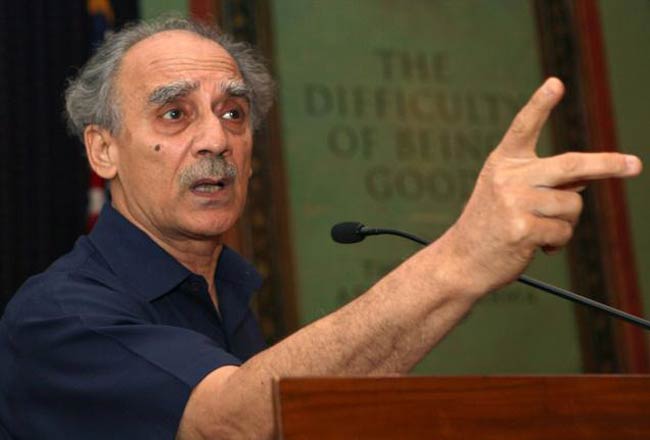

Arun Shourie, who was a minister in the Atal Bihari Vajpayee government, has slammed the Narendra Modi government for its handling of economic policies and issues related to the minorities.
Former union minister Arun Shourie has launched a scathing attack on Prime Minister Narendra Modi, accusing his government of having no clear vision on economic issues and turning a blind eye to attacks on minorities by right-wing groups.
The 73-year-old journalist-turned-politician, who was an influential BJP ideologue during the government led by Atal Bihari Vajpayee, also referred to the controversial monogrammed suit that Modi wore during his interaction with US President Barack Obama in January and described it as a “critical mistake”.
Shourie said during an interview with Headlines Today’s Karan Thapar on the first anniversary of the NDA government that the manner in which the ‘trimurti’ (trinity) of Modi, BJP chief Amit Shah and finance minister Arun Jaitley was running the BJP has “frightened” members of the party.
‘Handling of economy directionless’
Describing the government’s handling of economic issues as “directionless”, he said: “The government seems to be more concerned with managing headlines than putting policies in place. The situation is like the many pieces of a jigsaw puzzle lying in a mess with no big picture in mind about how to put them together.”
Shourie dismissed the government’s claims about achieving a growth rate of 8% as “all hyperbole”. He said, “Such claims are meant to grab headlines but lack substance.”
Without naming finance minister Jaitley, also a leading lawyer, Shourie said the government lacked a stable approach for dealing with investors and “lawyerly arguments” will not convince them.
Shourie also dismissed other achievements claimed by the government, including reducing inflation and fiscal deficit, increasing Foreign Direct Investment, de-regulating diesel or coal and the telecom spectrum auction. He said much of it was the result of things that have nothing to do with the government, such as a fall in oil and general commodity prices.
‘Govt turning a blind eye to attacks on minorities’
The former minister for disinvestment and information technology was very critical of the government for turning a blind eye to attacks on minorities and their institutions by right wing groups.
Shourie said there was “great anxiety” among minorities after the attacks on Christian institutions and the “Ghar Wapsi” and “love jihad” campaigns. He criticised Modi’s “silence” on issues related to social tensions created by the activities of right wing groups and statements by some BJP MPs and leaders.
“You tweet when Sania Mirza wins a championship or greet someone on birthdays but you don’t do such things when moral questions are involved. People doubt why he is silent,” he said.
Referring to former IPS officer Julio Ribeiro’s remark that he felt like an “outsider” after attacks on churches, Shourie said when people of such standing make such comments, it means things have gone too far. “We have to wake up,” he said.
Talking about the alienation of Muslim youngsters in the context of “love jihad”, Shourie said, “If 100 Muslim youth come together and conclude that we are not getting justice here and that ISIS is right, then we have a problem at hand”.
Referring to the way the BJP was being run by Modi, BJP chief Amit Shah and finance minister Jaitley, he said, “It has offended the opposition as well as frightened the members of the BJP.”
The speed of the BJP’s expansion has scared the opposition to such an extent that they were ganging up against the ruling party, he added. Shouries stressed the need to take along the opposition if the government wants to push its economic reforms.
‘Modi’s suit a critical mistake’
Shourie referred to the controversy over the monogrammed suit worn by Modi during Obama’s visit to India in January and wondered how the prime minister could invoke Mahatma Gandhi and, at the same time, wear such an expensive suit.
“It was inexplicable, incomprehensible and a big critical mistake,” he said.
“I fail to understand why he accepted and then wore that suit. You cannot take Gandhiji’s name and wear such a thing,” he said, adding, it was good that Modi disposed of the suit quickly through an auction.
Critical of the way the land acquisition bill has been handled, Shourie said the issue should have been left to the states instead of generating a controversy in Delhi. He expressed disappointment that the NDA regime’s promises had not been matched by deliveries and suggested the government should lower its profile and embrace the advice of others.
Shourie is considered an expert on India’s economy but like most top BJP leaders from the Vajpayee era, he has not been given any role in the new regime.
Read the full interview
Q: Before we discuss Mr. Modi’s government in detail let me ask you a simple scene-setting question. What impression have you drawn from the first year in office, are you impressed or disappointed?
Arun Shourie: Well…for efforts to the Prime Minister 100 per cent, other ministers I don’t know what they are doing or what is happening; on foreign policy very high marks for focus and energy; on economy-directionless, great disappointment; on social relations- great anxiety; on institutions – anxiety bordering on apprehension. So, good in parts.
Q: Let’s take each of those elements of that very comprehensive answer one-by-one so the audience can understand your thinking in greater detail. Let’s start with foreign policy where many people believe Mr Modi has achieved his greater success. The impression is that India’s relationship with countries like America, Japan, France and Canada has improved but also with neighbouring countries like Sri Lanka, Nepal and Bangladesh. Is there a common theme that runs through all of this which suggests a reorientation of foreign policies?
A: I think first is the energy that Modi has brought to this. It is exemplified with the response, the alacrity with which the government has responded to the disaster in Nepal. Second is, if you just see the countries you were enumerating, Modi’s own visit to Bhutan, Nepal, Japan, the Indian President being in Vietnam on the eve of the Chinese president coming here, Modi’s visit to Australia, to Fiji, to the Indian Ocean states, then to Canada, US, pacific powers… there is one focus. Yes, there is a focus and that is China. I feel the inference is that Mr Modi correctly regards China as the principal challenge to India in the long run and is sort of touching bases before going to China later in the month.
Q: In your estimation how important is this reorientation of foreign policy with China and the challenge from China as the principal focus?
A: It’s a very important focus but is has to be followed up. India has great goodwill. India is not regarded as a predatory power except perhaps by Pakistan. We also have a reputation of not following up what is agreed to in MoUs and declarations. A good academic was telling me the other day that we have a large number of MoUs with China also, from agriculture to space.
Q: Why are you scared Mr Modi won’t follow up?
A: No, because that’s the traditional way of Indian foreign policy, so I would only urge that please ensure follow up. If you have agreed to some projects please execute them quickly, for instance, they are very important for our navy, the Indian Ocean states, but you must do them quickly.
Q: Alongside China, where people believe that Mr Modi has brought not just energy and new improved relationship is America. It began with his visit in September to Washington. Then there was President Obama’s visit as chief guest for Republic Day in January. People say there has been a sea change. A) Do you agree? B) If there has been a sea change, how important and significant is it?
A: I think it is a continuum. Since the collapse of the Soviet Union, the Indian foreign policy is getting reoriented and if you see from Narasimha Rao’s time till now there is continuous thing of a closer relations with United States, also.
Q: So there’s no great break that Mr Modi has made in this relationship?
A: No, not a great break I think, he has brought a new way doing things like big meetings in New York and so on.
Q: So China is a new departure in things and America is a continuation of the past and building on the past?
A: Yes. China was a great apprehension that was swelling and he has sort of started to focus on it.
Q: But in terms of the relationship with America, he is building on the past. He may be moving faster, but there is a continuum here.
A: He has to move much faster because I was told by somebody who was in a position to know that actually Americans are feeling quite impatient. They were prepared at one time to move very fast on joint production of aircraft carriers. They are the best today, not Gorshkov.
Q: So impatience is creeping in already?
A: Yes, and they (America) were prepared to give very important operational intelligence which we have not grabbed.
Q: So therefore, in other words, Americans are getting impatient therefore we need to move faster but we need to grab opportunities rather than sit on them?
A: Yes, otherwise they will look elsewhere. Nobody is waiting for us.
Q: So this is a bit of advice to Mr Modi?
A: Not advice but certainly my small suggestion.
Q: Now there is one area many people feel there is lack of clarity and some say there is even confusion that is in India’s relationship with Pakistan, our most troublesome neighbor, some even say the Modi government has sent out contradictory signals.
A: Yes, I think contradictory signals partly because there is over optimism that every new PM has that yes I can improve relations with Pakistan where everyone else has failed.
Q: Is Modi guilty of over optimism?
A: No, I don’t call that guilty, but certainly probably he might have shared at least the evidence of the steps that were taken seem to suggest that. I would therefore plead that it is not a good idea in search for out-of-the-box thinking… in the fascination for out-of-the-box ideas… to ignore the institutional memory which is embedded in, say the Ministry of External Affairs, of dealing with Pakistan, of dealing with China… you should actually also reach outside the ministry and look for experts who have devoted their lives or many years to studying China… General V Raghavan, Shyamsaran and several other persons… Reach out to them and give them the confidence that they can say things to you which may be against your instincts.
Q: Two quick follow up questions or may be three actually. One: You get the feeling that the institutional memory of the foreign office or experts outside the foreign office are not being used by the Modi government sufficiently and it needs to be used more?
A: I don’t know if it’s being used. I am not privy to that, but I would urge given but I have seen regard to Panditji (Jawaharlal Nehru) that you must use them much more.
Q: You are also suggesting by implication don’t rely on your PMO, no matter how large it may be. You must involve the foreign office?
A: Yes, of course, and the other ministries also. PMO today is very large but its talent quotient and expertise quotient is like any other ministry. So you can’t have atomic energy and Japan and everybody else only from the PMO.
Q: Are you also suggesting that Modi needs to involve Sushma Swaraj more?
A: I don’t know the extent of involvement of Mrs Sushma Swaraj as a person.
Q: The belief is that in fact Mrs Sushma Swaraj is perhaps on the margins of foreign policy making though she is foreign minister.
A: I don’t know what the position is if that were the case then that does not bode well because every minister must… after all they are the ones who are interacting with the institution all the time.
Q: Is there is a danger in the Modi government that sometimes flashes that come to an individual overnight then end up becoming policies the next morning and there need to more reflected thoughtful thinking involving the institutional strength of our foreign office rather than relying upon a flash of inspiration that come a person.
A: I felt that in regard to the economy certainly to which probably we’ll turn to later on but this policy is by ill-harm… by a revelation.
Q: And what about in terms of foreign policy?
A: I think there has been a theme that is being pursued continuously regard to this may be in regard to Pakistan there were certain ‘ok, let’s try this one, let’s try that one’.
Q: Pakistan is the great failing…
A: Not the great failing, it is the thing which requires a steadier gaze.
Q: So America is success, China is a success, neighbourhood is success… Pakistan needs a steadier gaze and it needs more careful thinking?
A: Yes, I think so. I mean just wait for things to happen in Pakistan before jumping up and down and thinking.
Q: So you began your answer by saying that one area of great success is Modi’s handling of foreign policy, certainly the public perception is of surprise that he was of so adept and so adroit at handling foreign policy but actually beyond that you are saying something very important: you need to follow up. Often India doesn’t. You need to be aware that the Americans becoming impatient, you need to grab opportunities otherwise they will go away to someone else and on Pakistan stop being contradictory and you need clearer thinking?
A: Yes, steadier thinking.
Q: Let’s now move from foreign policy to economic policy, which perhaps is the principal reason why the country elected the Modi government. A lot was expected. Many people say there’s disappointment others say economic delivery is the greatest disappointment. Would you agree with some of that?
A: Yes, I think so and unfortunately I would agree because there were two-three main problems and that was to re-commence to investment cycle and enough is not being done on that.
Q: When you say that you are disappointed, explain to me why are you disappointed? What is it that you were hoping would happen and it hasn’t happened or hasn’t happened sufficiently?
A: So I will give just two-three sentences. Just allow me to do that. Investment cycle: private investment was the key at this time. They were over-indebted, the companies, therefore they needed (loans) from banks, the banks themselves were burdened with bad loans… so you have to do something about professionalising of the banks, recapitalising the banks. Taking away the bad loans to a tarp-type arrangement so that the market sort of re-evaluates the banks and the banks can raise money and the whole cycle can begin. I am just giving one example. That is the challenge they had and nothing has been done.
Q: Absolutely nothing?
A: I don’t see that. You know how much industrial credit has grown in last one year? Only three and half per cent.
Q: So when you talk to industrialist, what explanation they give, why they are not investing? Beause Mr Jaitley claims a lot has happened. Why do industrialists say to you nothing much has happened?
A: Well, because they don’t see anything. Their own projects… Yes, they have been cleared… clearances is one thing… the project has to come through with finances. One example: If the factory has to be set up at some taluka you have to follow up there that you cannot have without cooperation of chief ministers….that has not happened.
Q: Something that Mr Jaitley enumerated last week when he was in America. He has a list of what he calls the government’s achievements… prima facie on papers they are very impressive… for instance he points out inflation is down to 5 per cent, fiscal deficit to 3.9 per cent, current account deficit to around one per cent, growth he says has gone up to 7.5 per cent then in addition he says there’s increased FDI in defence and insurance, coal and spectrum auctions have happened, diesel is deregulated, land acquisition amendments have happened and despite all this you point out to me that investment has not happened?
A: First point is every government at every time can give you a long list. Second is for many of these items he has enumerated the credit is not for this government. Oil prices coming down, all other commodity prices coming down… that has helped. So task of leadership is to appropriate failure and distribute success. Here it is the opposite.
Q: Aren’t the coal auctions and the spectrum auctions to the credit of this government?
A: Yes, of course. For coal auction and spectrum the credit is that the government has implemented the Supreme Court judgment on this. The good thing to do. They set the stage for the future for allocation of these things. But the figures that are being put out for auctions.. please look at them carefully. Sethi and Bakshi two authors analysed the figures on coal auctions. Two lakh crores garnered by government. It turns out that actually it’s going to be 6,200 crores. This is what would come. Two lakh crores would come when the companies that have won the auctions produce coal at the rated capacity of the mines for 30 years. They are showing as if I have got it now.
Q: When you say this, it actually means they are misleading people?
A: They are managing headlines. Unfortunately there is too much focus on managing headlines regard to the economy and that is going to rebound.
Q: I want to come to the big picture. Are you suggesting, when you say the economic handling is directionless, there is not sufficient thinking and planning and proper policy?
A: There is not enough reaching out to experts who know it. There is too much confrontation, with too many persons… Supreme Court today, Reserve Bank tomorrow. Not a good idea.
Q: In other words, experts who should be involved are not being involved.
A: And secondly uncertainty that has been created with tax administration…this is just an example….
Q: Many people feel Modi government repeatedly gave assurances of a stable tax regime. But FDI looks at high profile cases like Vodafone, Nokia, Shell, Cairn, Vedanta and they get frightened. And now FIIs look at the prospects of retrospective tax, and say what’s happening… This is going back on the assurances we were given. Has the Modi government mishandled tax or is the Modi government’s attitude to the tax misunderstood?
A: Of course they have mishandled it, how can there be any doubt on that. You suddenly send notices to Shell, Nokia to everybody, having said that you will not have retrospective taxation or retrospective dues. The PM’s office itself writes that you should attend to public grievances and the letter has been put out in public domain and then suddenly you say Rs.40,000 crores are owed on a tax that was there from 1987. And the government of India has said thrice that it does not apply to FIIs.
Q: And now they’ve suddenly changed their position.
A: Not only that, then the FIIs withdrew some money. Two days and then they said, no, no, no, no, those FIIs which are located in countries where we have tax treaties we’ll not charge. No, notices have gone not for Rs.10,000 crores only for Rs.906 crores. Then they said what about the FIIs investing in debt instruments? Because that’s 3 lakh crores. So suddenly, yesterday Mr Jaitley announces in Parliament that will also not come. So that show ye sirf do din ke sher hain.
Q: So how bad a message has the government’s tax handling sent out to investors both at home and abroad?
A: First it alienated them and now it has made them laugh. It is going to retard foreign investment in India because they require ability and predictability and that is not happening.
Q: So two major errors have happened. One: a failure to understand how you revive tax assessment as a result of which investors are not investing. Secondly- sending out the worst possible message so that FDI is also put off.
A: Yes… and third that within the economic sector the institutional reforms has not been any paid attention to at all whether it is banks or the regulatory framework all of which impinges on investment.
Q: The government says that it’s Make In India policy is iconic. They believe it is a critical way of boosting manufacturing as result to which employment will happen, job will and livelihood. Critics say that is actually a great idea but you are not doing enough to actually make it happen. The first thing that’s needed is labour reform, but instead of the Central government tackling that, all that the Central government is saying is emulate Vasundhara Raje Scndia. Do you agree with the critics or with the government?
A: The first step has been taken with great energy with Modi’s speed and that is that officers like Amitabh Kant and all have worked hard and the simplification of clearances has been done. Backlog of projects has been cleared. But as you were mentioning…not just labour reforms… other things are required. And my suggestion including on land is that leave it to the states. Land is a state subject. Why are you getting into controversies in Delhi? So I have suggested earlier on also that under Article 254 (2) what you should do is make a general announcement that on these items which are on the concurrent list when a state government passes a law which makes us as competitive like southeast Asian countries, we will automatically approve it. When as CM of Gujarat Modi was handicapped his proposals not being cleared by Centre.
Q: Why has Modi failed to something which he has been advocating as Gujarat CM?
A: I don’t know.
Q: When a majority government came to power, a great hope was for far reaching radical economic reforms. A year is gone by and we’ve seen a lot of tinkering but far reaching economic reforms are not happening.
A: Because the direction has not been articulated. Because if you don’t have the large picture clear in your own head, then it’s just jigsaw pieces lying around. The big picture to put it together is missing also many pieces are missing.
Q: Who is responsible in our government for having that big picture that frames economic policy, the PM, Finance minister?
A: All of them together. When a person like Deepak Parekh says nothing has changed on the ground. Then it better wake up.
Q: But the Finance minister disputed that?
A: Oh. Yes, he will dispute many things. He is a good lawyer. But government should not rely on lawyerly arguments. Remember our good friend Kapil Sibal. Where is his zero-loss theory today?
Q: What is your perception of how investors see the Modi government at the end of the year?
A: They are hoping that maybe things will change. Next month from now or one year from now. A person on whom I put great reliance on he was telling me that government is thinking to plan.
Q: The government keeps saying they have done enough to put the country back on a trajectory of 8 per cent growth moving very rapidly. Do you accept that claim?
A: It reminds me of good friend TC Rangachary once said “jo hyper bole, so nihaal” and the government is talking big and the delivery is not happening.
Q: There is a great belief that some institutes are being neglected. We don’t have a Chief Information Commissioner, we don’t have a Chief Vigilance Commissioner, Election Commission posts are empty. All the Lokpal posts are unfilled and perhaps the worst the Cabinet Secretary is about to end his second six-month extension and no new man is yet appointed. Does that worry you?
A: Yes it worries me. And there are two points. One is Mr Minoo Masani use to say cows are sacred so we don’t kill them. We just starve them to death. Institutions are being starved to when appointments are not being done. And there is a lesson for us, the ordinary citizens, in that. The ordinary citizens be very vigilant. For instance the RTI is very important right, if is squeezed by appointments not being made, we must make it visible. I do not know how this happens. I am not familiar with the administrative rules. It is incomprehensible. These institutions are vital institutions. This is a criticism of government.
Q: The government moved very quickly to move governors, UPA incumbents were shifted out. Are the new appointees better in quality or much of the same.
A: They are the same. As my good friend Ram Jethmalani once said that all these Raj Bhawans have become these old persons’ homes and the institution has been devalued. You put your favourites and I will put my favourites. It’s a retirement benefit.
Q: There was a feeling that Modi was reaching out and empowering civil servants. Particularly he said feel free to come to me directly. You don’t even have to go via your minister. Now increasingly there is a belief the power is centralised in the PMO. Even notes from the one ministry to other have to be vetted by the PMO and he is disempowering the civil servants. What’s your assessment of how Mr Modi is handling the bureaucracy?
A: Some officers are certainly giving a very good account of themselves and they are able to put in good work day and night. I gave you the example of Amitabh Kant. But in general the feeling is everything has to be sent to the PMO. And in the PMO at least one report suggested things are lying.
Q: So centralization in the PMO was a mistake?
A: No the mistake is the other way. The PM relies on the bureaucracy as its principal instrument not for instance on his ministers. But this bureaucracy is different from what it used to be 30 years ago. Either you must induct experts from outside in a critical mass or you have to find other ways.
Q: What about the government’s handling of Parliament? That is one of the critical institutions, there was a lot of criticism over the way ordinances are used and particularly land acquisition amendments were pushed through by ordinance as a result of which many of the Opposition felt offended?
A: I think the ordinances were ill-advised because firstly let’s take the disruption of Parliament. For the ordinances, Parliament was disrupted, but who said disruption of Parliament is a parliamentary tactic and when the other fellow does it, they are not being Parliamentary? They are being parliamentary. And similarly on the Land Bill, today we are being told that the bill as was been passed would have paralysed the industry. I am sure the prime minister himself feels this and after that they were not able to carry this message as to why these amendments were necessary. They should have shown here are four defence projects that have got stuck due to it. Then it would have been a case.
The confrontation is with everybody. The government’s failure to reach out has led to the failure of the government policies. We just had elections in West Bengal and Amit Shah went there on behalf of the party. What did he say? That I have come here to uproot the TMC. If you have to come to uproot me then you think tomorrow I will cooperate with you?
Every regional party or their allies feel that these people are expanding their footprint so fast that I am going to get crushed so they say let’s get together ourselves. Everybody is focusing on 323 or whatever seats they have. Please focus on another figure that you have come to Delhi with just 31 per cent of vote. By expanding at such a fast speed, you have frightened the others.
Q: Who is responsible for this?
A: I don’t know, may be nature.
Q:You mean Mr Modi’s nature.
A: I don’t know. There is a wonderful phrase of David Hume that you and I should also remember that he said Who is it who has not been ruined by his own nature. That is not just Modi, I think, today the government of India and the party (BJP) consists of three persons. That’s all. They are Modi, Jaitley and Amit Shah. These three, they work as a team and you can’t just blame Modi or anybody else but the problem is this ‘trimurti’ is not getting feedback from elsewhere. They have frightened not only their allies but their own party men
Q: So the rest of the party is frightened or has been alienated from them?
A: Certainly frightened of telling them the whole truth. And the third problem is, as in all political parties, that if I take a wrong decision and the consequences are terrible, let’s say, I get Kiran Bedi in Delhi and we lose, it is regarded as the master stoke of the master strategist and you are then slapped by the Delhi people. You get 3 sets out of 70. Who is now to decide some wrong decision was taken? The same three. So, no corrective action takes place. So what do you do? You (BJP) say Chintan Shivir karayenge.
Q: The same three do the chintan?
A: Shatrughan Sinha says it very well: first it is Chintan Shivir, then it is the Chinta Shivir then it is the Chita Shivir…this is the situation in all political parties.
Q: Has Modi made a good and quick transition from a chief minister to a prime minister?
A: Whilst Prime Minister Modi had made a good and quick transition from a chief minister to a prime minister in foreign policy, in economic policy he still thought and behaved like a chief minister. A Prime Minister needs to think in terms of policy.
Q: Do you think the Christians are right to feel upset?
A: When a person like Mr. Ribeiro, who saved Punjab with Mr. KPS Gill for India and the country owes so much to him, says he is moved to say that he feels like an outsider and an unwanted person in his own country, things have gone too far. No, the minority people are certainly not wrong in their conclusion. We have to wake up and there is great danger. ISIS is at our doorstep and if a hundred young Muslims conclude to join the terrorist organisation, we will have a real problem.
Q: Do you think Mr Modi needs to speak out more often?
A: If Modi tweets on Sania Mirza’s victory and wishing on somebody’s birthday and then he doesn’t say a word on critical issues like Ghar Wapsi, Churches and Love Jihad, it will draw an inference.
Q: Was Modi’s wearing of the monogrammed suit lack of judgement or was it a critical mistake?
A: Lapses of judgement can be very critical mistakes. I cannot understand which person would have gifted him that suit. And certainly, I can never understand how he ever chose to accept the gift or wear it. The point is you cannot take Gandhiji’s name and wear such a thing. I don’t know how it happened. It was very good that he got rid of it very quickly.
Q: What about Mann Ki Baat? Is it a clever, good innovation that creates a direct link between the PM and the people?
A: I don’t know. It depends on. All communication is good… but I would like to suggest the government to lower its profile. Second, embrace others, seek other people’s cooperation.
